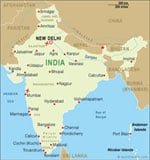The Supreme Court of India said on Wednesday that a colonial era law banning gay sex should not have been struck down, reversing a 2009 decision, the NYT reports:
 The ruling reverses a landmark judgment by a lower court, which in 2009 decided that an 1861 law that forbids “carnal intercourse against the order of nature with man, woman or animal” was unconstitutional. The 19th century law, passed by the British, makes gay sex punishable by 10 years in prison. Only Parliament can change that law, the Supreme Court ruled.
The ruling reverses a landmark judgment by a lower court, which in 2009 decided that an 1861 law that forbids “carnal intercourse against the order of nature with man, woman or animal” was unconstitutional. The 19th century law, passed by the British, makes gay sex punishable by 10 years in prison. Only Parliament can change that law, the Supreme Court ruled.
There is almost no chance that Parliament will act where the Supreme Court did not, advocates and opponents of the law agreed. And with the Bharatiya Janata Party, a conservative Hindu nationalist group, appearing in ascendancy before national elections in the spring, the prospects of any legislative change happening for years is highly unlikely, analysts said.
Anjali Gopalan, founder of a charity that sued to overturn the 1861 law, said she was “shocked” by the ruling.
“This is taking many, many steps back. The Supreme Court has not just let down the L.G.B.T. community,” Ms. Gopalan said, referring to gays, lesbians, bisexuals and transgenders, “but the constitution of India.”
 Reuters adds:
Reuters adds:
The move shocked gay rights activists, who had expected the court simply to rubber-stamp the earlier ruling. In recent years, India's Supreme Court has made progressive rulings on several rights issues.
"We see this as a betrayal of the very people the court is meant to defend and protect," said Arvind Narayan, one of the lawyers representing the consortium of gay rights groups that was defending the 2009 judgment.
"In our understanding, the Supreme Court has always sided with those who have no rights."
Faith-based groups lobbied the court heavily:
"All the major communities of the country — the Hindus, the Christians and the Muslims — had appealed against the ruling of the Delhi High Court," a lawyer for a Muslim charity told reporters.
"They had said that this unnatural sex is not permissible in all the religions of the world."
Thursday's decision could now be appealed through a so-called "curative petition", which would be heard by a panel of five judges.

Voices Against 377, Alternative Law Forum, Adhikaar and other petitioners including parents of LGBT persons, mental health professionals, academics and law professors, issued a statement:
We are deeply disappointed at the decision of the Supreme Court in Suresh Kumar Kaushal v. Naz Foundation. The decision by overturning the historic Delhi High Court judgment which recognized that LGBT persons are full citizens of India, attempts to stem the tide of history. By overturning the Naz Foundation judgment, the Supreme Court has, in one fell stroke again reduced LGBT persons to the status of what the Delhi High Court memorably called 'unapprehended felons'. The judgment of the Supreme Court is a unconscionable blow to the dignity of LGBT persons who as per the Indian Constitution are entitled to equal treatment. It withdraws the protective arm of the constitution from LGBT persons and renders LGBT persons vulnerable to discrimination, violence and harassment.
It is a tragedy that this judgment forgets the vision of the founders of the Indian republic which was so eloquently captured by the Delhi High Court. By re-criminalizing LGBT persons the judgment ignores the spirit of inclusiveness which is the heart of the Indian Constitution as articulated by Jawaharlal Nehru. It equally abandons the principle of constitutional morality (ie majorities dont have a charter to discriminate against minorities purely because they are majorities) articulated by Dr. Ambedkar which is the cornerstone of a diverse and plural nation.
The judgment is thus a deep betrayal of the fundamental constitutional promise that the dignity of all citizens would be recognized and that equal treatment is a non negotiable element of the world's largest democracy. In this betrayal of constitutional faith, the Court has shredded the very principles it has sworn itself to uphold.
This decision today along with the decisions upholding the emergency and legitimizing rape marks the lowest ebb in the illustrious history of the Supreme Court. In 1975 in ADM Jabalpur v. Shivkant Shukla, the Supreme Court upheld the declaration of emergency which deprived all citizens of the right to life in India. In 1979, in Mathuras case, the Supreme Court in effect declared that women who were raped should be disbelieved. In 2013 the Supreme Court has held that LGBT persons are not human beings whose dignity and life is violated by a colonial law.
Hard as this decision is and difficult as the road forward may be, we draw strength and inspiration from ordinary LGBT persons who will not allow this to affect the way they lead their lives. In the course of the last ten years or so, LGBT persons have begun to lead their lives openly and publicly proclaiming their claim to equal citizenship. The page of history has turned and no power on earth can deny LGBT persons the right to freedom, equality and dignity. Rights are not conferred by the Court, as the Naz judgment said, they are merely confirmed by them. The rights of LGBT persons cannot be taken by this decision.
We proclaim that in spite of the judgment of the Supreme Court, the only way the LGBT movement will go is forward and the arc of history though long will turn towards justice. We pledge to continue this struggle with re doubled vigour till such time that Section 377 is consigned to where it belongs- the dustbins of history.



